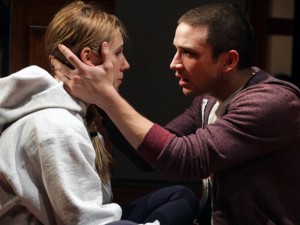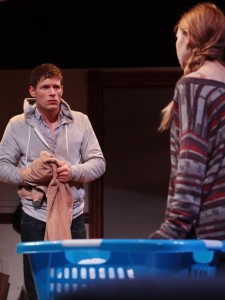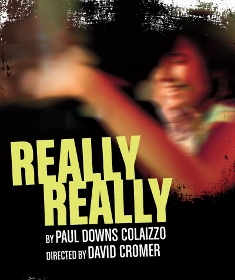THE PARADOX OF A CONTEMPTUOUS PLAY AND ITS AFTEREFFECTS
Early in Act II of Paul Downs Colaizzo’s incisive new play Really Really, my theatergoing companion Liz let out an audible sigh of frustration at the same moment as I slouched in my seat and crossed my arms. All too predictably, this is where the drama was headed. Really? Really?
The problem is that Really Really is a well-constructed play, given a sharp and provocative production by MCC Theater – but the worldview it perpetuates about  this generation of Millennials is cynical to the point of being infuriating for this twenty-something critic.
this generation of Millennials is cynical to the point of being infuriating for this twenty-something critic.
In the chilling opening scene, two girls stumble back to their apartment after a wild college kegger. David Cromer’s direction – precise as ever – highlights the disturbing details that will unravel across the drama. In the darkened living room, one drunk and giggly girl’s hand bleeds through a bandage. The other girl removes her stilettos and nervously flips open her cell phone every few seconds to check for text messages; she then curls up on the couch and lets out a plaintive moan: “Ow.”
 This “Ow” comes from the traumatized Leigh, a lower class college senior who is engaged to well-off Jimmy (Evan Jonigkeit), but has had a crush on the hot sports star Davis (Matt Lauria) for a while. At first glance, the exceptional Zosia Mamet plays Leigh as a cipher; still and staring blankly into the distance, Leigh appears to be acted upon more than she acts. Yet the plot hinges on a question of just how manipulative and self-serving our generation can be – and as the plot unfolds, Leigh may be the most conniving of them all.
This “Ow” comes from the traumatized Leigh, a lower class college senior who is engaged to well-off Jimmy (Evan Jonigkeit), but has had a crush on the hot sports star Davis (Matt Lauria) for a while. At first glance, the exceptional Zosia Mamet plays Leigh as a cipher; still and staring blankly into the distance, Leigh appears to be acted upon more than she acts. Yet the plot hinges on a question of just how manipulative and self-serving our generation can be – and as the plot unfolds, Leigh may be the most conniving of them all.
 The cast is sexy and savvy across the board – including Colaizzo, who stepped into the role of smart guy Johnson last weekend – but every twenty-something character in this play’s vision of the “me generation” is not only flawed, but essentially irredeemable. Leigh’s best friend Grace (a particularly outstanding Lauren Culpepper) is the peppy president of the Future Leaders of America; after her drunken night at the top of the show, she travels to the FLA convention and gives an ironic motivational speech, interspersed throughout the rest of the play. Yes, we are the future: We who are too absorbed in our iPhones (emphasis on the I) to interact with the people who physically occupy the same room. We who abandon our friends in service to ourselves. We who freely twist the truth to get ahead.
The cast is sexy and savvy across the board – including Colaizzo, who stepped into the role of smart guy Johnson last weekend – but every twenty-something character in this play’s vision of the “me generation” is not only flawed, but essentially irredeemable. Leigh’s best friend Grace (a particularly outstanding Lauren Culpepper) is the peppy president of the Future Leaders of America; after her drunken night at the top of the show, she travels to the FLA convention and gives an ironic motivational speech, interspersed throughout the rest of the play. Yes, we are the future: We who are too absorbed in our iPhones (emphasis on the I) to interact with the people who physically occupy the same room. We who abandon our friends in service to ourselves. We who freely twist the truth to get ahead.
Admittedly, the heated emotions that this play has conjured could only stem from a tight script and a pointed production. David Korin’s modular set design is another standout component; the walls and furniture can be reconfigured to show two  different apartments – the guys’ and the girls’ – from multiple perspectives. Yet the play itself only ever offers one perspective on our generation: Colaizzo’s downright damaging worldview.
different apartments – the guys’ and the girls’ – from multiple perspectives. Yet the play itself only ever offers one perspective on our generation: Colaizzo’s downright damaging worldview.
Here’s food for thought: Liz and I emerged from the theater in a bit of a rage and talked through our many issues with the play’s representation of our hopelessly solipsistic generation on our walk to the subway station. Later that afternoon, we took to our cell phones and texted through the controversial elements with friends who had already seen the production. We chatted with tumblr and twitter buddies; we had coffee and conversation with roommates and friends. Across multiple platforms, both in person and online, we engaged in a meaningful dialogue about precisely what our generation is – and isn’t – about.
If Really Really is a starting place for a multifaceted conversation about the anxieties surrounding the Millennials, then perhaps that dialogue is this problematic play’s redemption. We have every right to be critical of the shifting culture, but I refuse to let this play’s cynical and disparaging perspective stand as a definitive representation of my generation.
photos by Janna Giacoppo
Really Really
MCC at the Lucille Lortel Theatre
scheduled to end on March 30, 2013
for tickets, call (212) 352-3101 or visit http://www.mcctheater.org/



{ 1 comment… read it below or add one }
This critic may be too young to understand that she’s reviewing a play (a fiction) and not an essay or a story about her and her friends. Are there people like this? Yes. Is this play about her? Guess she doesn’t think so, but it seems to have hit a nerve and sparked some interesting debates and that’s bad…why? Dramatic characters should be redeemable. Who wrote that in stone? Redeemable characters makes us feel better for identifying with some of their loathsome actions. That’s a dramatic device to placate you. Truth is, not everyone is likable or good at heart – not the fictional characters on stage or the ‘real characters’ on my subway rides to work. The writer may have been heavy handed at times, but he seems to be writing what he knows, and just maybe, he knows you.